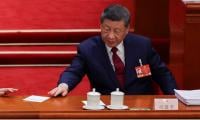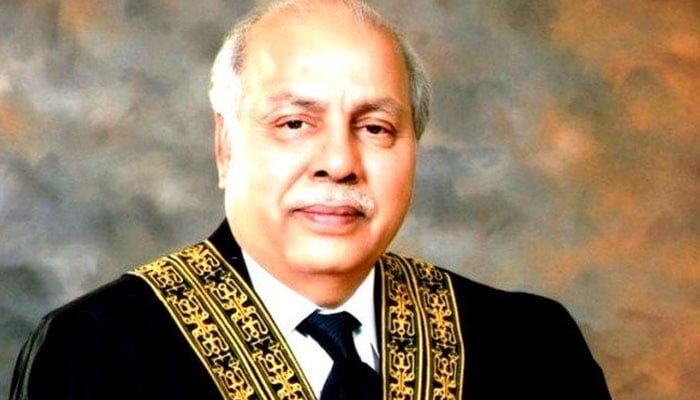Centre, provinces doing nothing about Corona: CJP Gulzar Ahmed
ISLAMABAD: Questioning the government’s preparedness to effectively address the Covid-19 challenge, the Supreme Court on Monday emphasised harmony among the state institutions and various stakeholders to control the pandemic.
“One person is sitting in a room giving directions, while others are saying something else. There must be harmony among the state institutions and stakeholders to deal with the calamity,” remarked the Chief Justice of Pakistan (CJP) Justice Gulzar Ahmed while heading a five-member bench hearing a petition, challenging the bail granted by the Islamabad High Court (IHC) to 408 Adiala Jail prisoners in view of the coronavirus outbreak.
The court directed establishment of quarantine centers at the Taftan, Chaman and Torkham borders and availability of all the required facilities to check and screen the human traffic and submit a compliance report.
Attorney General for Pakistan (AGP) Khalid Javed as well as advocate generals of Islamabad Capital Territory (ICT) and Punjab, the petitioner, Federal Minister for Human Rights Dr Shireen Mazari and Special Prosecutor National Accountability Bureau (NAB) appeared before the court, while Advocate General Sindh Salman Talibuddin, Advocate General Balochistan and Advocate General Khyber Pakhtunkhwa (KP) argued through a video link from the branch registries.
The chief justice observed Dr Shireen Mazari had filed a CMA stating that the Peshawar High Court (PHC) had released some 3,200 prisoners. However, the KP advocate general informed the court that the Peshawar High Court had not passed any such order.
The chief justice observed that since the attorney general for Pakistan was assisting the court, the court would only accept things from him and not from any other person from the federal government.
Dr Mazari said she would agree with whatever the attorney general would submit before the court. At the outset of hearing, the chief justice questioned the government’s preparedness to deal with the COVID-19.
The chief justice noted with great concern that instead of taking some effective practical measures for controlling the pandemic, the government was only issuing directions but on the ground nothing practical could be seen.
He further observed that all the patients, other than those affected by the coronavirus had been left at the mercy of God. He said all the hospitals had been closed and the outdoor patients departments (OPD) were not functioning.
“What sort of emergency is this?” asked the chief justice. The top judge said the other day he had to take his wife for medical check-up but there was not a single hospital in the city where the OPD was functional.
“Finally, I had to ask for opening up the OPD of a hospital to check my wife,” he said without disclosing the name of the hospital. The CJP further noted with concern that apart from the public sector hospitals, the OPDs of private clinics and hospitals were also not functional.
“What sort of emergency has been imposed that all the hospitals in the country have been closed?” The chief justice said no one knew what was happening on the ground, adding that the federal government was doing nothing.
“Why heart patients, diabetics and those facing other diseases are being ignored, as all hospitals in the country are closed and these patients are now at the mercy of God,” remarked the chief justice.
“What should we do with all these reports submitted by the government, as it makes no sense,” the CJP remarked adding that in the first phase, all hospitals had to be opened on immediate basis providing the best and maximum facilities to the corona patients.
“Instead of asking people to stay at home and wash their hands, there must be some practical measures to cope with the prevailing situation, the CJP remarked. Attorney General Khalid Javed Khan informed the court that they had submitted a report in this regard and the federal government was taking all the necessary steps.
The Chief Justice, however, asked him whether roads all over the country had been disinfected. “Have the roads been sprayed or the government is just relying on the messages asking people to stay at home and wash their hands?”
Justice Qazi Muhammad Amin Ahmed asked if the army had been called in aid of the civil power to which he replied in the affirmative. “Have you seen the heaps of garbage lying on the roads? Practically, we do not want to criticise any forum, but one has to take some practical measures which could be seen on the ground rather than in reports and directions,” he remarked.
“There is no mechanism available for making face masks,” the CJP remarked adding that the required goods should have been made by the government but it is only concentrating on distributing rations and nothing else,” he observed.
“Mr attorney general, there must be some progress report with some practical measures and steps for dealing with the pandemic as well as care about the patients suffering from other diseases. Everybody is passing their own orders. The chief ministers of all the provinces are also passing their respective orders from their homes.
We know and realize that the pandemic has engulfed the whole world and even super powers like the US as well as the United Kingdom are facing difficulties to cope with the situation, but there must be some unified strategy to cope with the crisis,” the CJP remarked.
“We don’t see any emergency and we don’t know how many testing centers have been established all over the country,” he remarked. However, Attorney General Khalid Javed requested the chief justice that he be allowed to give a briefing in his chamber.
The CJP said they had gone through the whole National Action Plan (NAP) and asked what sort of information the AG desired to give that the court did not know.
The chief justice also asked the AG about the professional capabilities of Dr Zafar Mirza adding that he daily appeared on the TV getting much coverage. The AG replied that Mr Mirza was a professional.
The chief justice asked if anyone from the Ministry of Defence was in the court.
“We just want to know as to what it is doing,” said the chief justice.
The AG submitted that he would file a report in this regard.
To a question about the role of the National Disaster Management Authority (NDMA), the attorney general replied that he had called all the persons concerned for giving a briefing to the court.
The chief justice noted that the government had made people addict by asking them to stay at home and get salary without doing work.
He further said the employees of organizations like the PIA and Pakistan National Shipping Corporation were not working but getting salaries. “Whenever we need even a small boat, we ask China for it,” the CJP remarked.
He observed that Parliament was there but the government did not take it into confidence while making preparedness to deal with the present crisis.
“There is a dire need for building national consensus in order to take effective measures for coping with the prevailing situation,” the CJP remarked. “That is fundamental,” Justice Umar Ata Bandial said, endorsing the chief justice.
The CJP said the entire Europe and the US had made proper legislations with respect to dealing with the prisoners. And by law, they have enforced this as well. Our only concern is to ensure that the fundamental rights of the people are not infringed upon,” the CJP said.
The petitioner’s counsel, Nayab Gardezi, questioned as to how most of the accused involved in heinous crimes could be released. The CJP, however, said the court was dealing with the instant matter in accordance with the law.
Advocate General Sindh Salman Talibuddin endorsed the attorney general’s arguments and submitted that the Sindh High Court had issued orders for the release of 519 prisoners.
Salman submitted that he had made a statement before the court on the last date of hearing quoting a press release issued by the Sindh High Court Registrar.
The chief justice reminded the AG Sindh that one prisoner whose bail was earlier rejected was also released and questioned whether it was legal. The AG replied it was an extraordinary situation. Salman, however, said he did not support the manner the prisoner was released.
“Whether the Sindh government has challenged it?” asked the chief justice to which the AG replied in the negative. The chief justice asked what would be the consequences of the action. The AG replied that whatever order the apex court would pass would be honoured and implemented.
“You are in the same position as the advocate general ICT has stated before the court,” the CJP told AG Sindh. “We have a written constitution and there is a trichotomy of powers wherein the executive, the legislature and the judiciary do their respective jobs. A judge is supposed to apply his mind in accordance with the law,” remarked the chief justice.
Advocate general Khyber Pakhtunkhwa submitted that as per law the high court could not be supported for issuing orders for releasing the prisoners and in this regard he cited various judgments of the Supreme Court examining the scope of high courts in connection with exercising the suo motu powers.
He supported the submissions and proposals given by the learned attorney general. He also said the provincial government was empowered under Section 401 of Code of Criminal Procedure, 1898 (hereinafter referred as CrPC) read with Prison Rules, to remit or commute the sentence of a convict, subject to the condition that he had undergone 15 years of imprisonment.
Advocate General Balochistan told the court that all hospitals were open in the province but the OPDs were only functional at the Fatima Jinnah and another hospital adding that they were also spraying the roads with the cooperation of the municipality.
Attorney general for Gilgit Baltistan told the court that all hospitals were open except the two which had been spared for the coronavirus patients.
He said there were a total of 368 prisoners in the GB but not a single had been released. Advocate General Punjab told the court that all hospitals in the province were open, while certain hospitals had been dedicated to the coronavirus patients.
He said most of the OPDs in the hospitals were functioning. He further said the only window of suo motu power was Rule 397 that dealt with the prisons. Advocate General Islamabad Capital Territory (ICT) told the court that the IHC had exercised Article 187 of the Constitution which was the exclusive jurisdiction of the Supreme Court.
The chief justice asked the AG whether he had raised this point before the Islamabad High Court. “And if the high court exercised the jurisdiction of the Supreme Court, then why you did not challenge it? Are you compromising on the law?” the CJP asked the AG ICT.
When the AG ICT was shifting to another point, the CJP asked him to first address the first point as to why he did not challenge the IHC order.
“We have a petition that has been filed against you,” the CJP told the AG adding that he was a law officer and required to assist the court. “Actually you don’t know as to what happened,” the CJP told the AG ICT adding that his job was to assist the court.
“We will write in our order what assistance you have given to the court,” the CJP told the AG ICT. When the court asked the law officer as to who was directed by the IHC for the release of prisoners, Adiala Jail superintendent appeared before the court and submitted that the IHC registrar had called him up seeking details about the prisoners.
Meanwhile, Attorney General Khalid Javed gave the court details citing various judgments of the Supreme Court pertaining to the suo motu powers jurisdiction under Article 184(3) of the Constitution.
-
 Nicole Kidman's Daughter Sunday Rose Under Intense Backlash Post-Keith Urban Divorce
Nicole Kidman's Daughter Sunday Rose Under Intense Backlash Post-Keith Urban Divorce -
 Teddi Mellencamp Reveals Medication Side-effects Landed Her In The Hospital
Teddi Mellencamp Reveals Medication Side-effects Landed Her In The Hospital -
 Chase Stokes Calls Out Morgan Evans Over Comments On Kelsea Ballerini Split
Chase Stokes Calls Out Morgan Evans Over Comments On Kelsea Ballerini Split -
 Elon Musk Says Legal Pressure Forced Him To Pay Full Price For Twitter
Elon Musk Says Legal Pressure Forced Him To Pay Full Price For Twitter -
 Sarah Ferguson’s Downfall & Housing Crisis: Pals Make A Decision On Radioactive Ex-Duchess
Sarah Ferguson’s Downfall & Housing Crisis: Pals Make A Decision On Radioactive Ex-Duchess -
 Taylor Swift Faces Awkward Situation Ahead Of Her Wedding To Travis Kelce
Taylor Swift Faces Awkward Situation Ahead Of Her Wedding To Travis Kelce -
 Anthropic, Pentagon Resume Talks On ‘high Stakes’ AI Defense Deal
Anthropic, Pentagon Resume Talks On ‘high Stakes’ AI Defense Deal -
 OpenAI Annualized Revenue Hits $25 Billion Milestone Amid Global Adoption Surge
OpenAI Annualized Revenue Hits $25 Billion Milestone Amid Global Adoption Surge -
 Princesses Beatrice, Eugenie’s Parents Hurt Their Future With William, Kate: ‘The Knives Are Out’
Princesses Beatrice, Eugenie’s Parents Hurt Their Future With William, Kate: ‘The Knives Are Out’ -
 Billy Porter Claims He Came Back From The Dead Amid Sepsis Battle
Billy Porter Claims He Came Back From The Dead Amid Sepsis Battle -
 Jason Dickinson Reportedly Headed To Oilers In Trade With Chicago Blackhawks
Jason Dickinson Reportedly Headed To Oilers In Trade With Chicago Blackhawks -
 Harry Styles Hints He's Ready For Marriage And Family Life
Harry Styles Hints He's Ready For Marriage And Family Life -
 David Harbour’s Ex Faced Extreme Humiliation At Lily Allen’s Producer's Birthday Bash
David Harbour’s Ex Faced Extreme Humiliation At Lily Allen’s Producer's Birthday Bash -
 China Targets Tech Innovations Amid High Stakes Rivalry With US: Key Strategies Explained
China Targets Tech Innovations Amid High Stakes Rivalry With US: Key Strategies Explained -
 Pacers Vs Clippers: Kawhi Leonard Powers Clippers Past Pacers For Third Straight Win
Pacers Vs Clippers: Kawhi Leonard Powers Clippers Past Pacers For Third Straight Win -
 Scientists Build Tiny AI Brain Model Using Monkey Neurone Data
Scientists Build Tiny AI Brain Model Using Monkey Neurone Data




